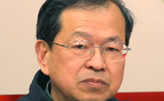JIAN XINHUA: Second ‘leap’ needed in agricultural reform
 China’s reform began in the countryside. Remarkable achievements were made after the central government issued the No.1 Document in five consecutive years from 1982 to 1986. In the 21st century, agricultural modernization has been relatively left behind industrialization, while urbanization and informatization are rapidly advancing. The No.1 Central Document has focused on the “three rural issues” (agriculture, farmers and rural areas) since 2004.
China’s reform began in the countryside. Remarkable achievements were made after the central government issued the No.1 Document in five consecutive years from 1982 to 1986. In the 21st century, agricultural modernization has been relatively left behind industrialization, while urbanization and informatization are rapidly advancing. The No.1 Central Document has focused on the “three rural issues” (agriculture, farmers and rural areas) since 2004.
In particular, the No.1 Document of 2015 explicitly called for intensified reform and innovation, and acceleration of agricultural modernization. In the process of implementing the spirit of the document, it should be clear that the key to addressing the “three rural issues” is to realize the second “leap” proposed by China’s former leader Deng Xiaoping (1904-97) by developing moderate-scale management and the collective economy.
At present, China is gradually realizing the second “leap” in agricultural development. In 1990, Deng put forward the theory of “two leaps” for China’s agricultural reform and development, pointing out that “two leaps” are needed for the reform and development of Chinese socialist agriculture in the long run.
According to Deng, the first “leap,” which needed long-term adherence, was to abolish the people’s commune, the largest collective unit and the highest of three administrative levels in rural areas divided into production brigades and production teams, and adopt the household contract responsibility system with remuneration linked to output, in which the household was the basic production unit. The second “leap” was to develop moderate-scale management and the collective economy, meeting the need of scientific farming and socialization of production.
The household contract responsibility system was established based on the then agricultural situation. It ensured peasants’ right to use land, promoted the development of agricultural production and maintained social stability. However, since the implementation of the system, most of rural collectives have lost income sources for various reasons. The rural collective economy in many areas actually exists in name only without the economic base. There have been many problems with China’s current farmland systems and operating ways to date, which urgently need resolving through deepened reforms.
China’s deepening rural reforms aim to gradually put into practice the second “leap” proposed by Deng. As the No.1 Document of 2015 stressed, high priority must be given to rural reforms to further vitalize rural economic and social development. Meanwhile, it is necessary to create new paths to optimize agricultural structure, seek new breakthroughs in the conversion of ways of rural development, boost peasant incomes and take new steps to construct the “new countryside.”
Emphasis should be laid on increasing input in agriculture, properly implementing farmland transfer and enlarging the scale of agricultural management. For example, apart from developing all forms of cooperative economy, such as production, supply and marketing, credit, and consumption, peasants may be encouraged to concentrate their farmland in rural collectives.
Only through the implementation of new rural collective management can agricultural modernization be pushed forward and internal division cooperation be conducted to solve peasants’ employment, such as establishing township enterprises owned by collectives, extending agricultural industrial chains and carrying out further processing of agricultural products.
The implementation of rural collective scale management aims to form modern operation and management modes in accordance with the requirement proposed in the new No.1 Document, and step up the construction of rural public infrastructure and services, forging the socialist new countryside.
Jian Xinhua is a professor from the Economic Development Research Center at Wuhan University.
